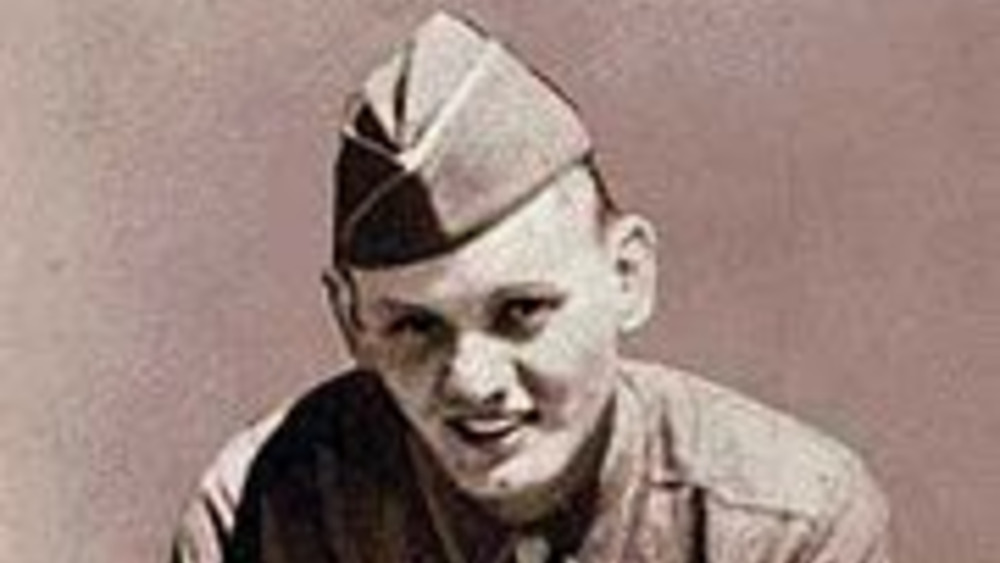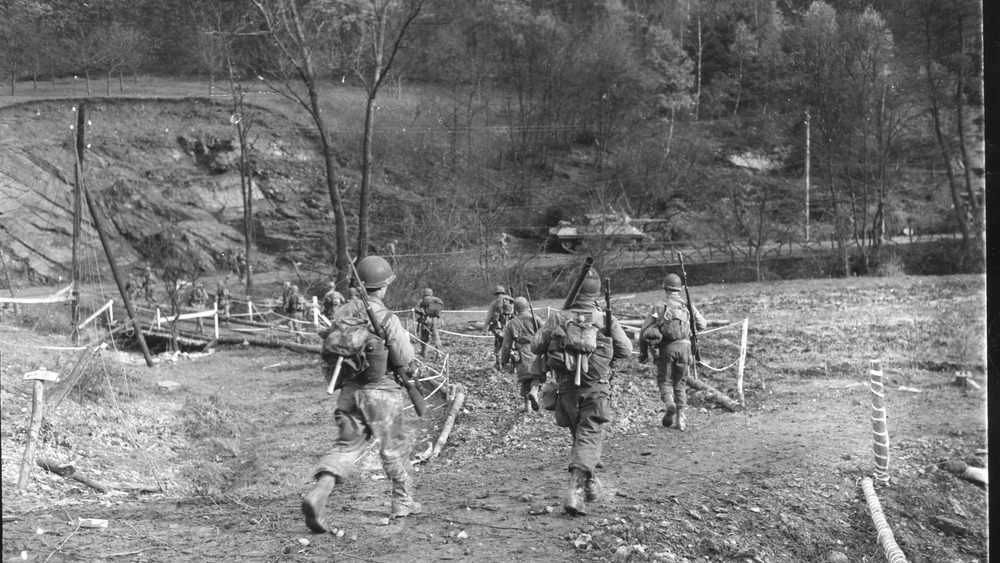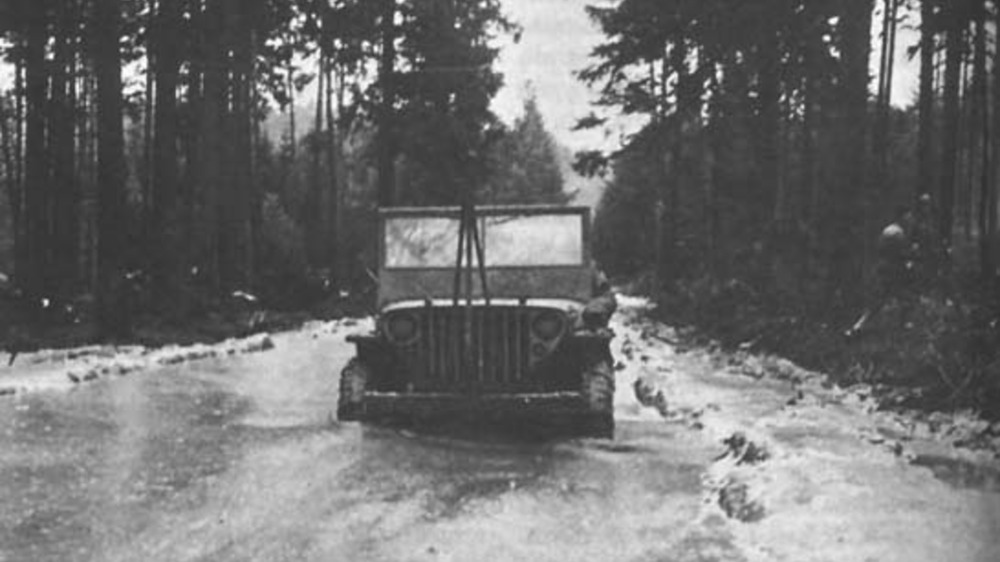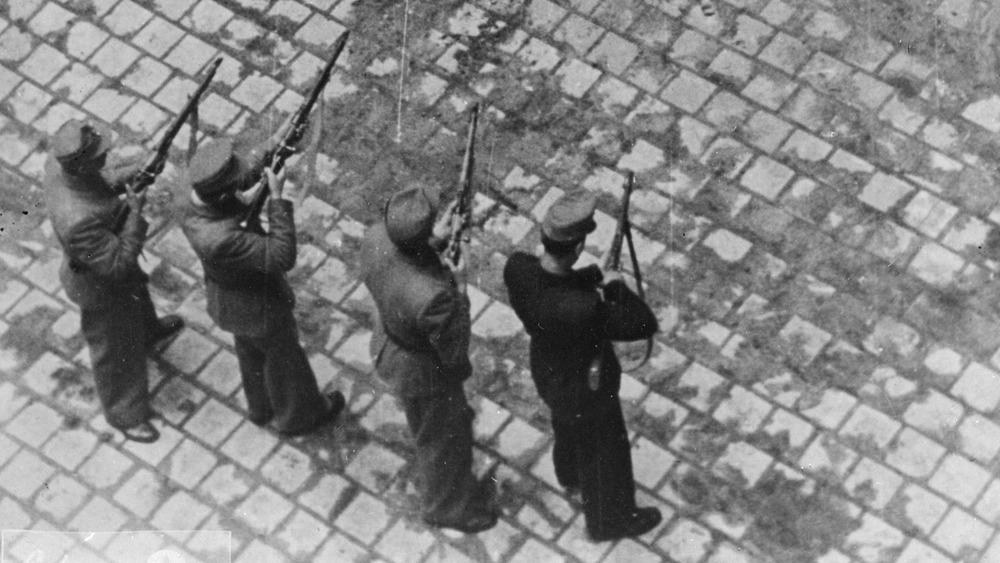The One American Soldier That Was Executed For Desertion In World War II
Private Eddie Slovik was only 24 when he was drafted and sent to the front lines of battle in World War II. He was assigned to join the fighting in German-occupied France, but the battle terrified Slovik, and he chose to flee the army rather than risk the line. Ultimately, Slovik would last less than a year in the military before being charged and convicted of desertion, a crime that was punishable by death. Slovik became the first and only American soldier to have been executed for desertion since the Civil War.
Slovik's case was worsened by that fact that he had a civilian criminal record. In 1932, he had been picked up for theft, breaking and entering, and disturbing the peace, according to World War II Today. He picked up another conviction in 1939 for drunk driving. In fact, it was this criminal record that allowed him to defer his first draft in 1941. He was eventually drafted in 1944, because the military desperately needed manpower to replace the many soldiers who had become casualties of the war.
'I Pvt. Eddie D. Slovik... confess to the desertion of the United States Army'
After completing basic training, Slovik was placed with the 28th Infantry Division and shipped to Elbeuf, France. The 28th Infantry was engaged in the Battle of Hürtgen Forest, a long and brutal fight that resulted in thousands of casualties on both sides. After coming under artillery fire for the first time, Slovik immediately knew he wasn't cut out for war. In August, he and a friend slipped away from the unit, and spent six weeks with a Canadian military police unit that had been passing through France. According to American Heritage, when the Canadian police eventually returned Slovik to his unit, he was told that leaving again would be considered desertion.
Slovik still chose to leave again, but on October 9th, he turned himself in to a field cook, handing him a signed note that read:
"I Pvt. Eddie D. Slovik No. 36896415 confess to the desertion of the United States Army. At the time of my desertion we were in Albuff [sic] in France. I came to Albuff as a replacement. They were shelling the town and we were told to dig in for the night. The following morning they were shelling us again. I was so scared nerves and trembling that at the time the other replacements moved out I couldn't move. I stayed there in the foxhole till it was quiet and I was able to move."
'It was my duty to this country to approve that sentence'
The note continued, "I then walked in town. Not seeing any of our troops so I stayed over night at the French hospital. The next morning I turned myself over the Canadian Provost Corp. After being with them six weeks I was turned over to the American M.P. They turned me loose. I told my commanding officer my story. I said that if I had to go out there again I'd run away. He said there was nothing he could do for me, so I ran away again and I'LL RUN AWAY AGAIN IF I HAVE TO GO OUT THERE."
Slovik was placed under arrest and taken to a prisoner stockade. He was given the chance to recant his written confession, but he refused.
In November 11, 1944, Slovik was formally charged with desertion and court-martialed. Slovik openly admitted to being guilty of the crime, and the court promptly found him guilty and called for his punishment to be death. Major General Norman D. Cota, the Commander of the 28th Division, signed off on the sentence, saying, "Given the situation as I knew it in November, 1944 I thought it was my duty to this country to approve that sentence. If I hadn't approved it – if I had let Slovik accomplish his purpose – I don't know how I could have gone up to the line and looked a good soldier in the face," via World War II Today.
The Army made an example of Eddie Slovik
Desertion had been a big problem throughout the war, so General Dwight Eisenhower decided to make an example of Slovik. On December 23, he denied Slovik's plea for clemency, confirming his execution by firing squad.
Per Daily Beast, on December Jan. 31, 1945, Slovik was taken before a 12-man firing squad in the town of Sainte-Marie-aux-Mines. He had an Army blanket around his shoulders, and a black satin cloth was placed over his head. Former Army Lt. Nick Gozik, who had been ordered to attend the execution as a military witness, remembered Slovik faced the firing squad without fear. "All I could see was a young soldier, blond-haired, walking as straight as a soldier ever walked...I thought he was the bravest soldier I ever saw...He walked right up to that post. You wouldn't believe it," Gozik recalled.
The squad fired on Slovik, but the first round of shots proved not to be fatal. A doctor declared Slovik was still breathing, so the squad was forced to reload. After the second round of shooting, the doctor finally pronounced Slovik dead.



